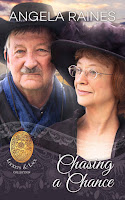Technically, the area I'm speaking about is called the tri-state area. It's where Illinois, Missouri, and Iowa meet. I was about 70 miles from Hannibal Missouri, where Samuel Clemens also known as Mark Twain grew up. The Mormon settlement of Nauvoo was about 20 miles away from my hometown. Added to that were the towns of Keokuk, Iowa and Quincy, Illinois which I will discuss in part two.
 |
| Painting of early Nauvoo |
Shortly after the Mormons had left Nauvoo, the Icarian's moved to the townsite of Nauvoo to start their own settlement. Initially those who came to the area planned to start a commune based upon the novel "Icaria" by Victor Hugo. They were faced with illness, lack of food, and an unkind mother nature. Still they persevered even going so far as using some of the stones from the Temple ruins to build the colony's schoolhouse. By 1855 the colony began to lose population and the town of Nauvoo barely maintained its existence until 1873 when the sisters of St. Benedict chose Nauvoo as the place for their convent and school.
However, Nauvoo was not the first settlement on the site. The area was first called Quashquema, in honor of a chief who headed a Sauk and Fox band of Indians, and numbered approximately 500 lodges. Around 1827 the white settlers were building cabins and by 1829 there were enough settlers for a post office and by 1832 they called their town Venus. Then in 1834 they changed the name to Commerce as the residents felt it was a better suited name for what they hoped the town would become.
 |
| Mark Twain Home, Hannibal, MO. (Wikipedia.org) |
The town of Hannibal was originally laid out by Moses Bates in 1819. But prior to Mr. Bates, the site had been used by the indigenous peoples of the area. The town itself was rather slow to find its footing but by 1845 it had become a city. A lot of the growth be attributed to its access to the Mississippi River and the growth of the railroads. What many people may not know is that in 1846 the Hannibal and St. Joseph Railroad was organized by John M Clemens, Mark Twain's father, and his associates. It was built to connect Hannibal with St. Joseph in the West. Story is the railroad was to have transported mail for delivery to the first outpost of the pony express.
One interesting fact about the town. During the Civil War, a number of black units were from Missouri, that fought campaigns outside of the state. There was one unit in the Missouri state militia about one hundred strong from the town of Hannibal.
This is just a brief overview of a rich and varied history of my hometown area. Thanks to newspaper and state digital archives along with access to older books, the stories have only become more exciting to me. When I write, I find that this 'inherited' history informs my stories. In the latest novel "Chasing A Chance" my characters are originally from this tri-state region, although they end up in Colorado, much like myself.
 |
| https://amzn.to/2ID1Nq2 |
Doris Gardner-McCraw -
Author, Speaker, Historian-specializing in
Colorado and Women's History
Colorado and Women's History
Member of National League of American Pen Women,
Women Writing the West,
Pikes Peak Posse of the Westerners
Angela Raines - author: Where Love & History Meet
For a list of Angela Raines Books: Here
Photo and Poem: Click Here
Angela Raines FaceBook: Click Here


I've read Part Two, which is also an interesting article. I enjoyed both of these very much. I hope you write more of the history of the area in which you grew up. My maternal great-grandparents lived for a while in Lamonie, Iowa. I'd love to know more about their life in Iowa, but ancestry research hasn't risen to the top of my 'to do' list yet.
ReplyDeleteThe Icarians also had settlements in Missori and Iowa.
DeleteI'm glad you enjoyed some of the history I grew up with. Like you say, these areas were the West before the West as we know it opened up. Doris
Actually Lemonie is about 175 miles (3.5 hours) from where I grew up. Doris
DeleteDoris, as always, this is such an interesting post. I know "some" about my grandparents and where they came from, and even my great grandparents. I would love to join Ancestry and really learn everything I can about them. I know it's fascinating, but where is the time? LOL Actually, most of my relatives settled in Indian Territory, and have been here or in Texas for many, many generations. I always love to hear about others' backgrounds and where they came from. Very interesting post!
ReplyDeleteThank you Cheryl. I've been fortunate that our library system allows card holders to use their computers for Ancestry research.While not quite as complete as a home version, it's a gift to be able to use for free. When I'm researching for non-fiction stories, I always take some time to hunt an ancestor or two.
DeleteI confess, I was a lucky person to grow up around such history and being from a small town, was willing to listen to the 'old-folk' tell their stories. That led to the passion I have for finding pieces of history that I get to share. I"m glad you enjoyed the history. Doris
Enjoyed your history about your area. Thanks for sharing.
ReplyDeleteYou are welcome Mary. I love sharing history! Doris
DeleteI read part II and then part I. Both wonderful. Thank you for enlightening us.
ReplyDeleteYou are so welcome, Anne. I grew up with and around history as you can see, and it has informed who I am. For that reason and the love of it, sharing is important to me. Doris
Delete